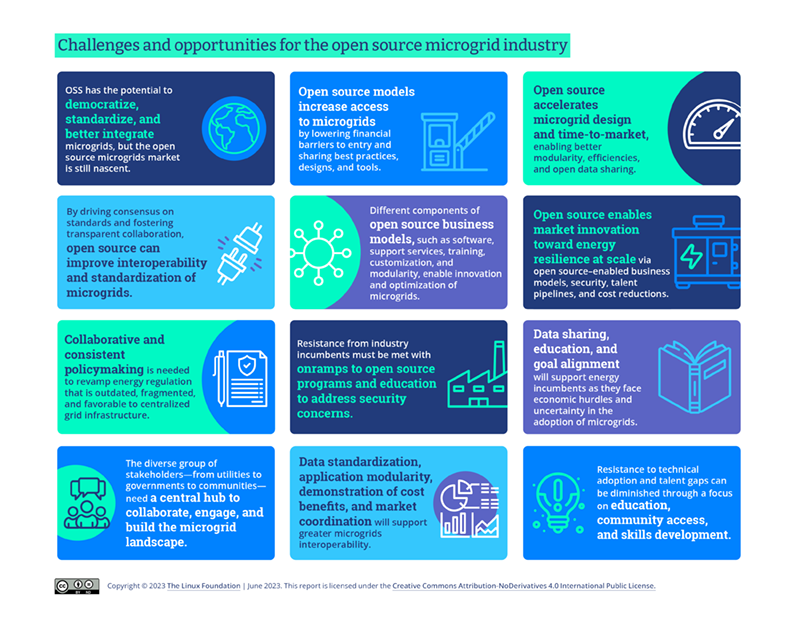Linux Foundation Research Finds Open Source Crucial to Realizing Full Potential of Microgrids
Open source is uniquely poised to help advance decarbonization by driving the adoption and development of microgrids.
PARIS – LF ENERGY SUMMIT – June 1, 2023 – The Linux Foundation, the nonprofit organization enabling mass innovation through open source, today announced the release of the LF Research publication “The Open Source Opportunity for Microgrids: Five Ways to Drive Innovation and Overcome Market Barriers for Energy Resilience.”
The research informs readers about microgrids – groups of distributed energy resources designed to improve energy resiliency, with the ability to operate as part of a larger electrical grid, or separately as an island. The report highlights the current state of the microgrid market and explores the potential for open source technology to accelerate the adoption of microgrids worldwide.
“Today we are faced with the dual challenges of climate change and the need to deliver affordable and reliable energy to all who need it,” said Hilary Carter, SVP Research and Communications at the Linux Foundation. “In this context, LF Research is thrilled to publish this report which describes the opportunities for open source to accelerate the proliferation of microgrids as a mechanism for clean energy production and consumption. We now have a clearer picture.”
Produced in partnership with LF Energy and Intentional Futures, and sponsored by Futurewei Technologies, the research offers actionable insights and recommendations for key stakeholders to engage with open source microgrid initiatives. Drawing from the expertise of leading individuals, organizations and projects within the microgrid space, it examines how participation in relevant open source programs and activities can help address gaps and challenges, and accelerate the learning, development, and governance of microgrid initiatives.
“This research report does a comprehensive analysis of the microgrid market and reveals certain gaps and challenges,” said Yue Chen, Head of Technology Strategy at Futurewei. “However, with increased government funding, policy support, and incentives for sustainable energy solutions such as open source based microgrids, the landscape is ripe for innovative approaches.”
The report concludes that microgrids are an essential tool to improve energy resilience and advance decarbonization, and that the market faces a range of challenges that the open source ecosystem is well positioned to address. Specific key findings include:
- Improving access to microgrid resources lowers barriers to energy access, expertise, and understanding across all stakeholders.
- Accelerating microgrid design and time-to-market helps overcome economic and policy hurdles through open data sharing, improved cost efficiencies, and modularity.
- Improving interoperability and standards adoption, by fostering ecosystem collaboration, consensus, transparency, and compatibility across the stack.
- Enabling microgrid business models, via software, support and consulting services, training and certification, customization and integration, collaborative partnerships, and advancing modularity.
- Enabling market innovation toward energy resilience at scale, supporting the Energy sector to adopt proven open source–enabled business models, security benefits, and cost reductions demonstrated in the IT and Telecom industries.
For more information, see the full report here.
###
